Hromadske report: a day with volunteers in Moschun
The wall of aerated concrete blocks is like a fortress wall that has to be taken: it is 12 meters long and three meters high. Men and women are pressing themselves against the wall in a chain, their feet firmly resting on the ground and the palms of their raised hands on the aerated concrete.
Their legs, backs, and arms have become one tense muscle. The wall begins to sway, the first cracks appear, and one of the guys shouts encouragingly: “F***!”. And the wall collapses in the opposite direction.
Local resident Serhii Tiutryn nervously touches his face: volunteers from the B50 have just demolished the last surviving wall of his house, which was smashed by russian shells in the village of Moshchun near Kyiv.
“If it wasn’t for the volunteers, we would have had to pay a private company at least 200,000 hryvnias for the dismantling,” says Serhii. “For us, this is a fantastic amount of money.
In February-March 2022, the village was the site of fierce fighting. According to the volunteers, more than 75% of all houses (over 2,000 homes) in Moshchun were destroyed. To help the villagers, B50 volunteers launched the “Reconstruction in the Hostomel Community” charity project.
Most people simply do not have the opportunity to clear the ruins and clear their yards of them on their own,” says Ruslan Habdulov, project coordinator and lawyer by profession.
“The state and local authorities cannot help them now, they simply do not have the necessary resources. And they are unlikely to have them soon. That’s why people turn to volunteers. Over the past year, we have cleared over a hundred yards in the Kyiv region. It’s not much, but we only work 1-3 days a week”.
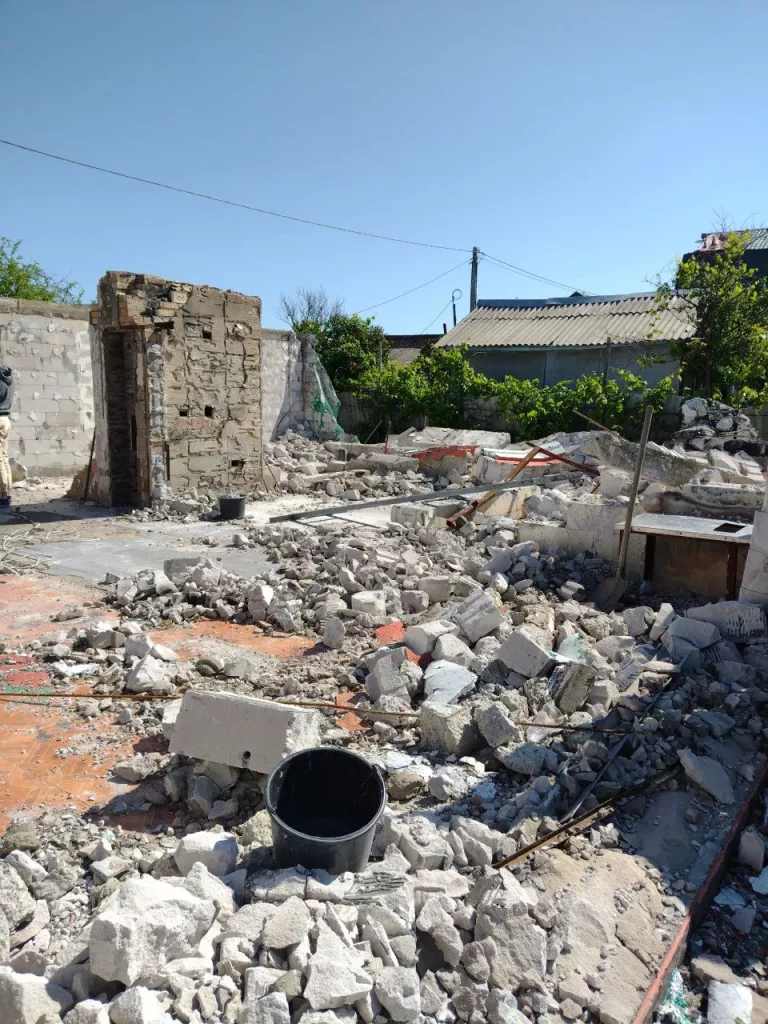
Maiia Orel
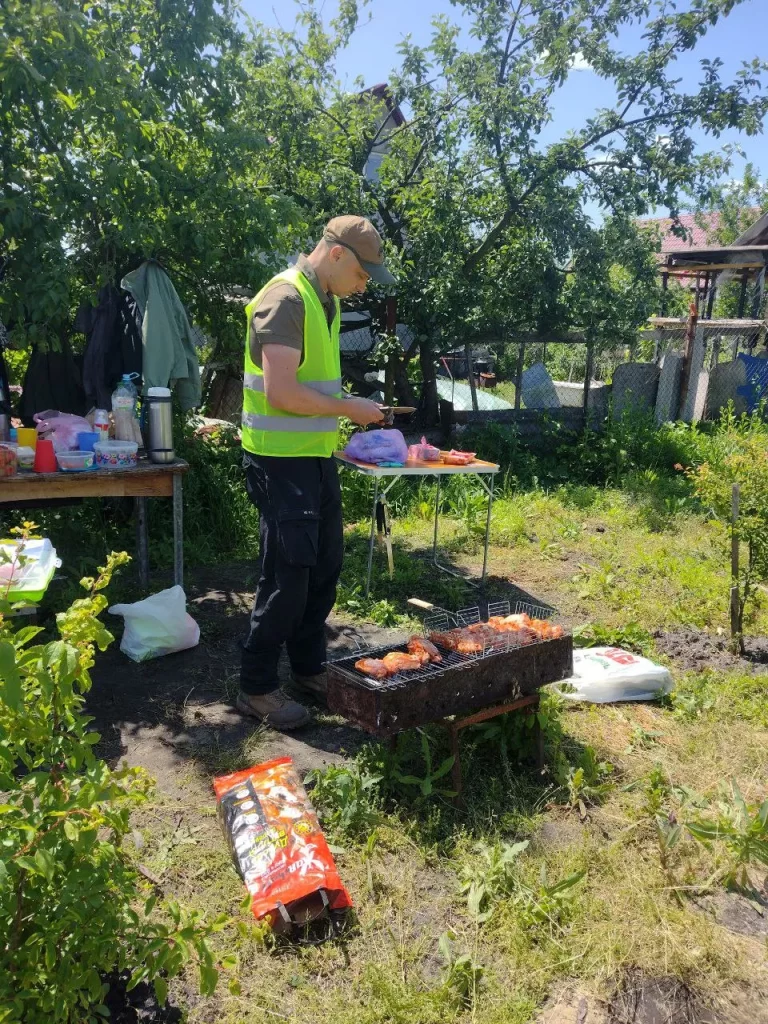
Maiia Orel
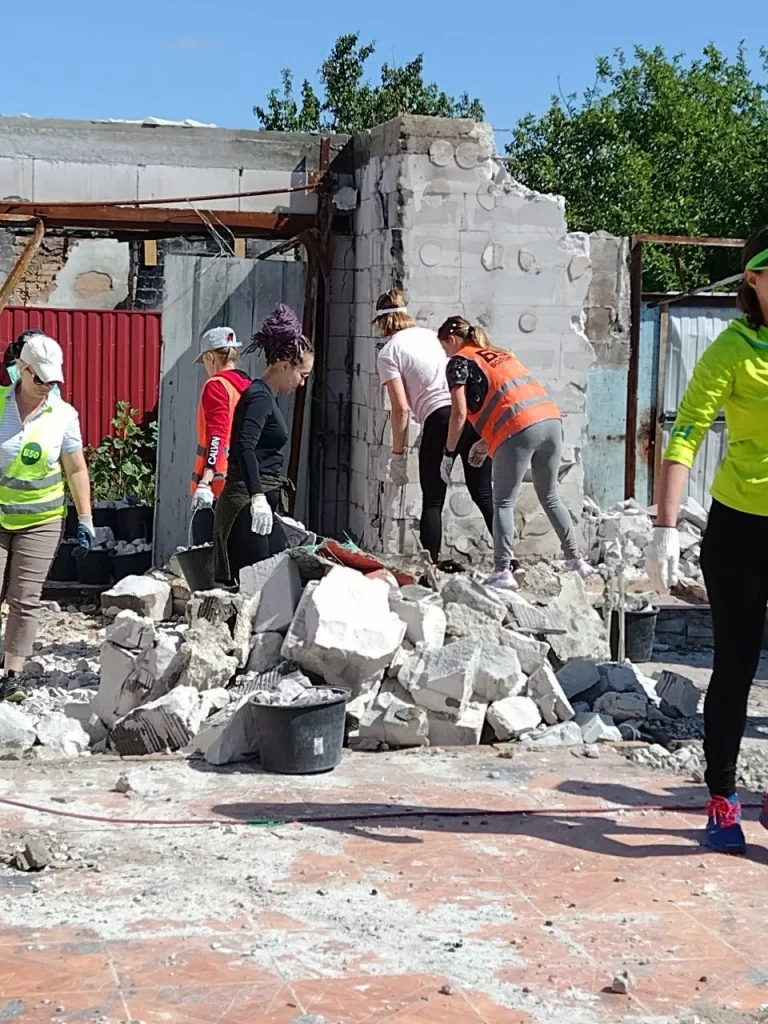
Maiia Orel
Each piece of rebar must be torn out by hand
At the agreed time, the volunteers gather at the outskirts of Kyiv – some from as far away as Boryspil, Obukhiv, Bila Tserkva, and even Nizhyn. It looks like a convoy of expensive cars on a Saturday morning on their way to relax. Who would have guessed that lawyers, scientists, IT specialists, managers of international companies, and translators, having worked a busy week, are going back to work.
In Moshchun, the coordinator of Saturday’s work, Sashko Tishura, a responsible employee of one of the ministries, introduces the newcomers to the safety rules and takes them to their locations. The helpers change their clothes, disassemble the tools – and God help them.
Serhii Tiutryn’s house was quite large – 212 square meters, built for a large family. The shells smashed the second floor, and Serhii was hoping to save at least the first floor, but now it became obvious that everything had to be destroyed.
Everything here resembles a newsreel from a century ago: there is no bulldozer or truck, and the only thing that is available is a hammer drill, but it is one for two dozen volunteers. So, every brick, every piece of reinforcement has to be pulled out by hand.
Denys Khrystenko, a highly skilled boat repairman by trade, “crumbles” the wall into small pieces with the punch, while others help him with crowbars: the pieces must be small enough to be easily raked up and carried away.
Some of the women form a chain and, like the pavement on the Maidan, pass blocks of aerated concrete to each other (the blocks seem quite light at first, but the longer you carry them, the more they become heavy). The last person in the chain puts the blocks into wheelbarrows. Anya Norynska, an executive at an international company, loads them like Lego bricks.
Bring the equipment!
Men are pushing wheelbarrows loaded with rubble to the end of the street, where a huge mountain, like a Donbas spoil tip, stands there, made of what were before the war, massive houses. The village council allocated special places for these spoil tips.
In April, when the anniversary of the de-occupation of Moshchun was celebrated and the President visited the village, the main street was cleared. Currently, some of the victims are hiring trucks for this purpose at their own expense. It is unknown when and who will eliminate the dump.
I also drive my car to the spoil tip, but I can’t dump the broken blocks with any skill. Unloading is a whole art: you have to do it in such a way that you don’t disturb your partners and don’t injure your legs. Sashko Treshchov, an employee of a foreign consulting company, helps us out. We have been working in pairs for some time.
“I am busy at work from Monday to Friday, so I was looking for a way to volunteer on weekends and have some physical activity, because I have a desk job. This is my seventh or eighth trip. Before Moshchun, I only worked and paid taxes, which is not enough. I feel sorry for the people here, there are families with children whose houses are completely destroyed,” says Sashko.
The dust eats away at his eyes. A tiny woman, as small as a teenager, is rowing nearby, stubborn as a wasp. Ira Kukh is a lawyer who works in real estate.
“Many of the people I used to talk to before the war are no longer my friends: they don’t donate to the army, they don’t help, and there are those who are pro-russian,” she says.
Hauling bricks is easier than listening to the stories of Moshchun residents about their troubles. They live in trailers among the ruins. Many of them don’t even have shovels to clear the yard a little. And here they need trucks and motorized tillers.
Donate via Buy Me a Coffee
The volunteers themselves have a hard time with working tools. They partially buy shovels, buckets, and wheelbarrows with money from their NGO. Pavlo Kulynskyi also buys equipment. He is an IT specialist and entrepreneur. And here is the guy who breaks walls, drives wheelbarrows, and trolls his friend Yuliia in a friendly way: oh, they say, the lady from oligarchic Kozyn had a fancy to work in Moshchun today.
“I really like this project because everything is simple, without bosses and bureaucracy: take more, throw it away. The guys and I brought our truck here and got diesel for the tractor when we needed it. I’m not the only one, everyone here does it – they help as much as they can,” says Pavlo.
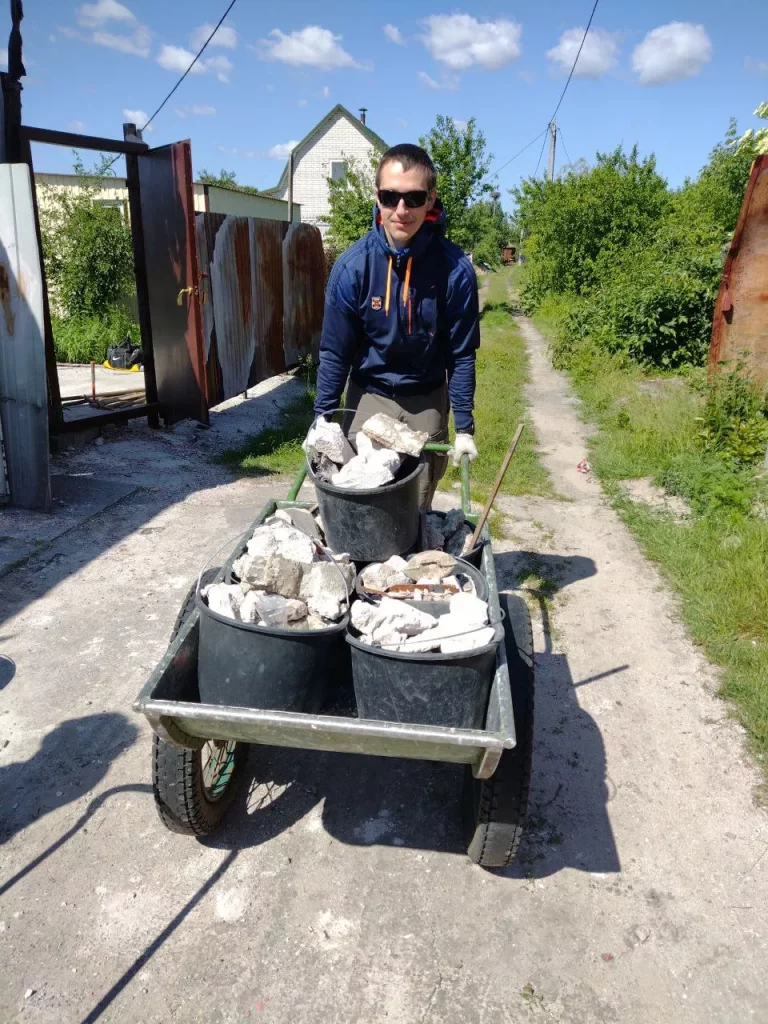
Maiia Orel
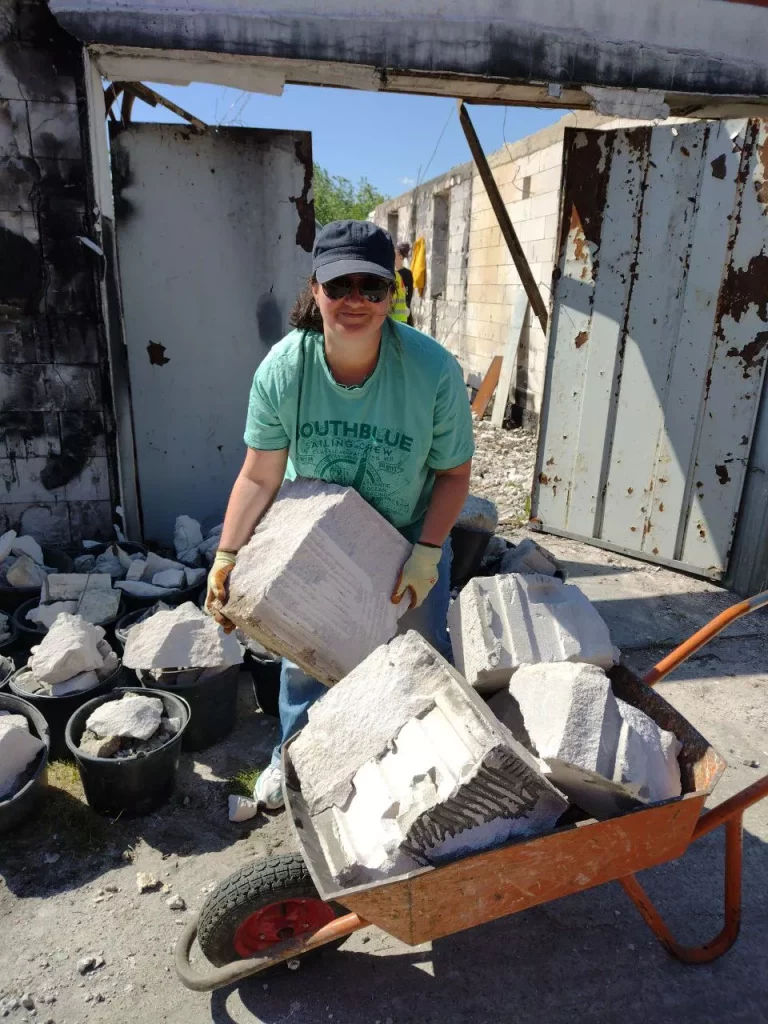
Maiia Orel
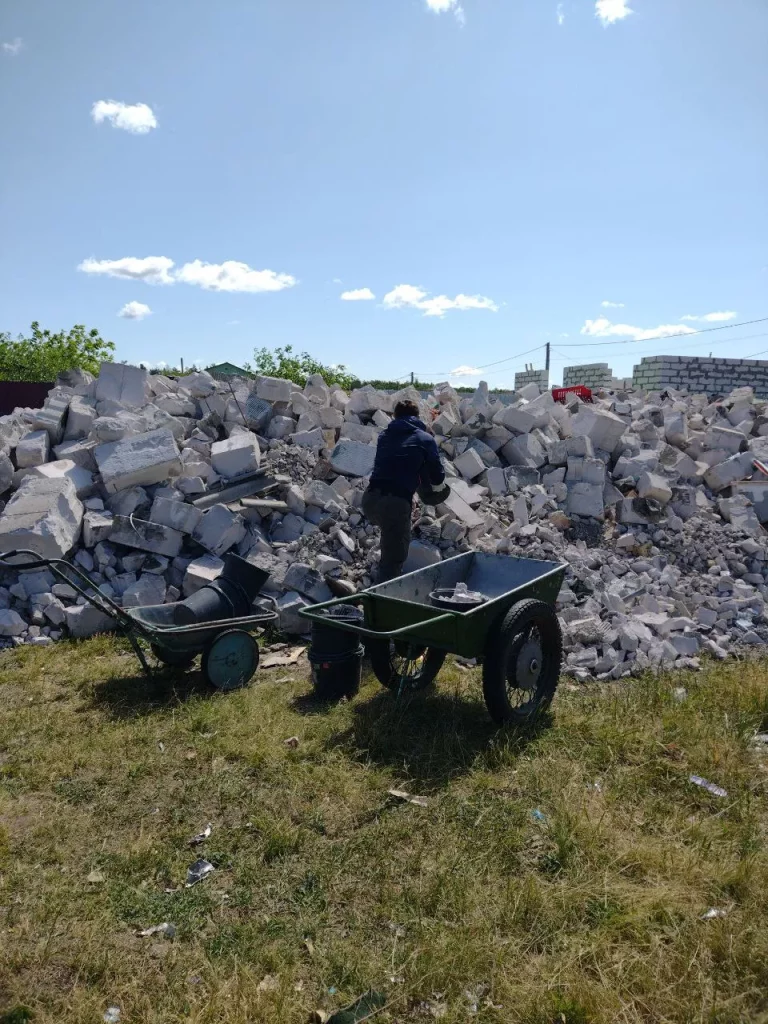
Maiia Orel
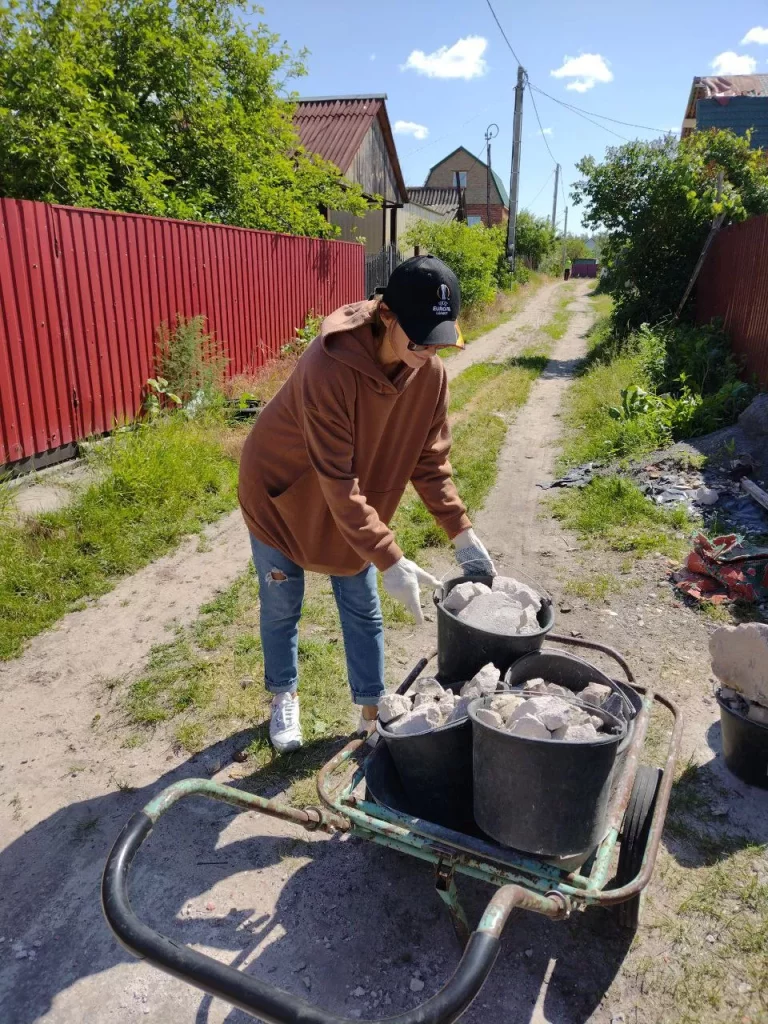
Maiia Orel
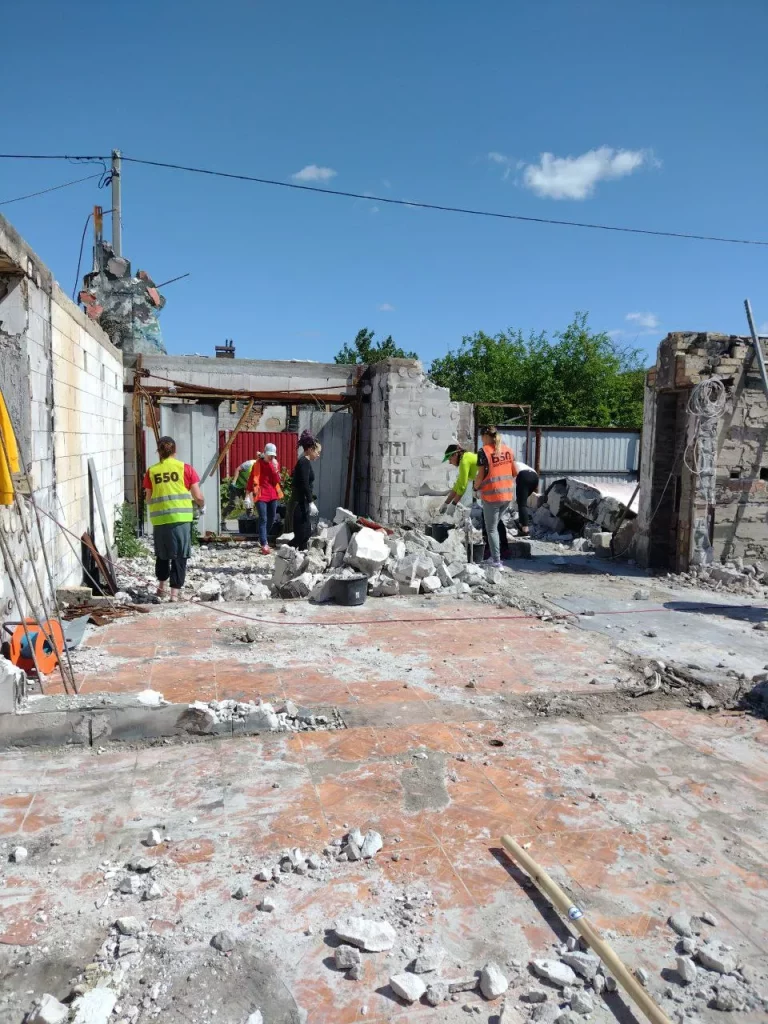
Maiia Orel
Apply and get in line
Pensioner Iryna Potomkina says that she sends sweets to soldiers at the front, but it’s not enough, so she’s in Moshchun.
“I like the way this project is organized: you go to the website, register for a trip, indicate which metro station you want to be picked up from, and a volunteer car will come to that station to pick you up. And after work, you will be taken home. There are always tools and protective equipment, and the coordinators distribute people to the locations – we arrive where we are expected”.
Today, Sashko Tishura is in charge of organizing the work. With a folder under his arm, he looks like a collective farm accountant from soviet comedies. In the folder are sheets that indicate who the volunteers are going to visit and the approximate amount of work to be done.
“Our system is very simple: Moshchun residents apply to B50, and we put them on a waiting list. Yes, we have a waiting list, because you can see how many ruins there are in the village. Serhii and Oksana, for example, applied in the winter. Then we examine the work front: the larger it is, the more volunteers and tools we need. We determine how many volunteers will come in their own cars, and distribute those who are “without a horse” to their cars. We usually work until 16-17 hours, less in winter. The good thing about our project is that no special training is required to participate in it – anyone can clear rubble”.
The volunteers didn’t have time to do everything planned for Oksana and Serhii from in one Saturday. They will come back next weekend. Oksana gratefully says goodbye: thank God, the broken house will no longer torment her soul.
I get in the car with Yuliia Horbasenko. Yulia is an entrepreneur and has been volunteering to clear the rubble for a while. She tries to go not only every Saturday, but also on Fridays.
“I’ll tell you, I prefer summer dust to winter frost and rain. It was very hard in winter. It was cold, everything froze into blocks, and you had to work with crowbars and then a pickaxe. The tea would get cold instantly, the cups would be in the snow, and the only way to warm up was to work, because not all the owners had trailers in their yards. In the snow and rain, our hands get wet and immediately freeze, and our feet go numb”.
We pass the “Epitsentr” (construction mall) in the Berkivtsi neighborhood of Kyiv. The parking lot is packed to the brim with cars.
“If at least a small part of these people came to Moshchun at least once a week, we would have already finished our work in this village,” Yuliia sighs. “Can you imagine how many villages like this there are in Kyiv region, all over Ukraine? There is plenty of work for everyone.”
Author: Maiia Orel
Source: Hromadske


